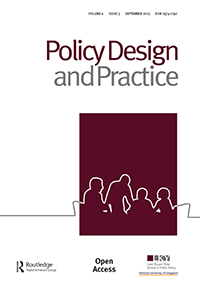Forming issues and publics: participatory design things and uncertain rural futures
IF 2.6
Q1 PUBLIC ADMINISTRATION
引用次数: 2
Abstract
Abstract Through a case of civic action in relation to rural development in Denmark, this paper contributes its deliberations on rural participatory policy by shedding light on the unordered site of controversy where participatory-oriented policy meets public involvement practices that happen beyond procedural limits. Danish rural planning is marked by economic and population decline and by economic pressure on the municipal sector. In this uncertain situation, rural livelihood and development increasingly rely on citizens. Drawing on perspectives from participatory design, public involvement, and Science and Technology Studies, and mobilizing the concept of design Thing, the paper attempts to understand a citizen-initiated participatory design (PD) process as an experimental means of public involvement in a rural setting. It analyses the intersection between the micro-level activities of the PD process and national and municipal plans, policies and procedures. In doing so, it traces how the socio-material PD process was a civic attempt to contest institutional definitions and to move the power to define issues from the authorities to the community. It analyses the role of the PD process in the articulation of shared issues, and how this process was one event in the ongoing community practices of public-ization of issues and of forming publics, so as to define local trajectories for an uncertain future. Continuing the analysis, the paper considers that the process of issue and public formation is neither linear nor uncontested; there is no single public, but rather multiple and porous configurations of difference and change.形成问题和公众:参与式设计与不确定的农村未来
摘要通过一个与丹麦农村发展有关的公民行动案例,本文揭示了一个无序的争议点,即以参与为导向的政策与超越程序限制的公共参与实践相结合,从而为其对农村参与政策的审议做出了贡献。丹麦农村规划的特点是经济和人口下降,市政部门面临经济压力。在这种不确定的情况下,农村的生计和发展越来越依赖公民。本文从参与式设计、公众参与和科学技术研究的角度出发,并调动设计的概念,试图将公民发起的参与式设计过程理解为农村环境中公众参与的实验手段。它分析了PD过程的微观活动与国家和市政计划、政策和程序之间的交叉点。在这样做的过程中,它追溯了社会物质PD过程是如何成为一种公民尝试,以质疑制度定义,并将定义问题的权力从当局转移到社区。它分析了PD过程在阐明共同问题中的作用,以及这一过程如何成为正在进行的问题公共化和形成公众的社区实践中的一个事件,从而为不确定的未来定义当地的轨迹。继续分析,本文认为问题和公众形成的过程既不是线性的,也不是无争议的;没有单一的公共,而是多种多样的差异和变化配置。
本文章由计算机程序翻译,如有差异,请以英文原文为准。
求助全文
约1分钟内获得全文
求助全文
来源期刊

Policy Design and Practice
PUBLIC ADMINISTRATION-
CiteScore
10.30
自引率
4.30%
发文量
19
审稿时长
13 weeks
期刊介绍:
 求助内容:
求助内容: 应助结果提醒方式:
应助结果提醒方式:


